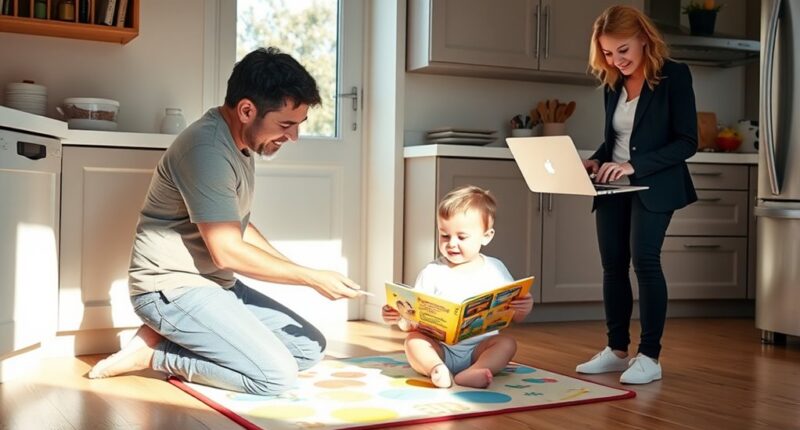The choice between being a stay-at-home or working parent is deeply personal, and societal stereotypes often oversimplify these roles, leading to unnecessary guilt or judgment. Neither option is inherently better; what matters is aligning your decision with your values, circumstances, and family needs. Balancing work, family, and self-care is key, and there’s no one “right” way to parent. Keep exploring to discover how you can find your best fit.
Key Takeaways
- Parental roles are personal choices influenced by individual values, circumstances, and family needs, not societal stereotypes.
- Both stay-at-home and working parents face unique challenges and emotional struggles, requiring understanding and support.
- Stereotypes like the “mom war” unfairly label parenting roles, causing guilt; decisions should prioritize personal fulfillment.
- Achieving balance involves open communication and self-care, emphasizing that there’s no single “right” way to parent.
- Respecting personal circumstances and avoiding societal judgments creates healthier, more supportive family environments.

Deciding between being a stay-at-home parent or a working parent is a personal choice that impacts your family’s daily life and long-term goals. It’s a decision that often comes with mixed emotions, especially when steering through the complex landscape of work life balance and parental guilt. You might feel torn between wanting to contribute financially and wanting to be present for your children’s milestones. It’s common to question whether staying home might lead to feelings of isolation or whether working outside the home might cause guilt about missing out on precious moments. But remember, neither choice is inherently better—it’s about what aligns best with your values, circumstances, and what makes you feel fulfilled.
Choosing between staying at home or working outside impacts your family and personal fulfillment, so trust what aligns with your values.
When you’re a stay-at-home parent, you often prioritize your children’s needs, which can make work life balance seem less relevant. However, this doesn’t mean you’re free from stress or guilt. Parental guilt can creep in, making you second-guess whether your presence is enough or if you’re sacrificing your career aspirations. Conversely, as a working parent, you may grapple with the worry that your career is taking precedence over family. The challenge is managing these feelings without allowing them to define your self-worth. The key is understanding that each role has its own set of sacrifices and rewards, and that finding a balance is an ongoing process rather than a one-time achievement.
It’s also important to dispel the myth that one path is universally better than the other. Society often portrays a “mom war,” implying that stay-at-home moms are more nurturing or that working moms are neglectful. These stereotypes can fuel guilt and shame, making you feel like you’re failing regardless of your choice. Actually, the right decision hinges on your unique situation, including financial considerations, career ambitions, and family dynamics. You don’t need to feel guilty for choosing what works best for your family, and you shouldn’t let societal judgments dictate your happiness or your parenting style.
Ultimately, your focus should be on what creates a healthy, supportive environment for your family. Whether you’re at home or in the workforce, prioritize open communication, self-care, and flexibility. Recognize that work life balance isn’t about perfect equilibrium but about making intentional choices that serve your family’s well-being. Free yourself from the myth that there’s only one “right” way to parent. Instead, embrace the path that aligns with your values and circumstances, and let go of parental guilt that stems from societal expectations. Your approach, whatever it may be, is valid and valuable.
Frequently Asked Questions
How Do Parenting Roles Affect Children’s Academic Performance?
Parenting roles influence children’s academic performance through parent-child engagement and academic support. When you actively engage with your child and provide consistent support, you help boost their motivation and confidence. Your involvement shows you value education, encouraging better focus and effort. Regardless of your role, fostering strong communication and support creates a positive learning environment, helping your child succeed academically and develop essential skills for the future.
What Are the Long-Term Financial Impacts of Each Parenting Choice?
You might think staying home or working impacts your finances long-term, but the truth is, thoughtful financial planning and strategic career progression matter most. Staying at home can save on childcare costs and build savings, while working can boost income and retirement funds. Your choice influences future financial stability, so prioritize planning now to guarantee long-term security, regardless of your parenting path.
How Does Each Role Influence Mental Health and Stress Levels?
You might find that your role influences your emotional well-being and stress management differently. Staying at home can reduce work-related stress, but may lead to feelings of isolation. Working parents often face time pressure, impacting mental health. Balancing responsibilities is key; prioritizing self-care boosts emotional well-being. Recognize your unique needs and seek support, so you can better manage stress and foster a healthier mindset regardless of your role.
You find that parent socialization and community involvement vary based on your role. Stay-at-home parents often join local playgroups, parenting classes, and community events, fostering strong social bonds. Working parents might connect through professional networks, parent support groups, or school activities. Both roles offer valuable social opportunities, helping you build a support system, share experiences, and stay engaged in your child’s development and community life.
How Do Cultural Expectations Shape Perceptions of Parenting Roles?
Imagine cultural expectations as an invisible thread pulling at your parenting choices. Gender norms and societal expectations weave these threads, shaping perceptions of what it means to parent. These unwritten rules can make you feel trapped or empowered, depending on how they’re spun. You might find yourself conforming to traditional roles or challenging them, but either way, understanding these influences helps you carve your own path amid the societal tapestry.
Conclusion
Ultimately, whether you’re a stay-at-home parent or a working parent, remember that your role is rich with resilience and relevance. Don’t let the mom war myths muddle your mindset or minimize your efforts. Celebrate your specific strengths, savor your shared sacrifices, and stand strong in your chosen path. Because, in this wonderful world of parenting, unity, understanding, and unwavering love truly outweigh any rivalry. Embrace your unique journey with confidence and compassion.









